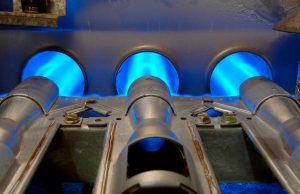 In the world of forced-air heaters, the two most accessible fuel choices are electricity and natural gas. Some homeowners have been using the same fuel forever, simply because they haven’t considered the other option. In some cases, they’re shopping for heaters and are now weighing the options.
In the world of forced-air heaters, the two most accessible fuel choices are electricity and natural gas. Some homeowners have been using the same fuel forever, simply because they haven’t considered the other option. In some cases, they’re shopping for heaters and are now weighing the options.
In this post, we’ll explain how gas and electricity vary in two common forced-air heaters: the furnace and the heat pump.
Furnaces
Furnaces are one of the most common heaters used throughout the country–especially their gas-powered variation. However, electric furnaces are also able to provide homeowners comfort.
Gas Powered
Natural gas is one of the cheapest fuel sources in most areas. For those who can use natural gas, it proves to be a cost-effective fuel source.
However, there are a few issues here. One is that natural gas isn’t available to all homeowners. In these cases, the cost of installing a gas line is going to more expensive than a typical heater installation. It could be wise to use an electric-powered system instead. This is, of course, completely up to the homeowner. They may find that the cost of installing a gas line will be a worthwhile investment after calculating the monthly operational costs. To really know for sure, it’s best to consult and strategize with a Bronxville heating service.
Electric Powered
If gas is not an option, a homeowner could also consider installing an electric furnace. These systems are similar to gas furnaces, except they use different heating elements. There are several benefits to this:
- The heating process is much cleaner and safer than that of gas furnaces. There’s no combustion and, therefore, no risk of carbon monoxide leaks and no build-up of soot.
- If the home has a perfectly good duct system, an electric furnace would be a less expensive installation than a heat pump and still be able to heat the whole home effectively.
- Heating through electricity is more efficient than gas heating.
But, there’s one major point to consider here:
- Electricity can be more expensive than natural gas. In this case, the homeowner should assess their needs and determine if they’ll be using this system constantly, or only occasionally, such as in a vacation home.
Heat Pumps
Heat pumps are fueled by electricity. But that doesn’t mean they’ll face the same dilemma of electric furnaces and suffer from high utility costs.
Heat Transference
Furnaces essentially create heat, either through combustion or electrical resistance. Generating heat in this fashion is an energy-intensive process. But it’s not the only way to heat a home, as shown by heat pumps.
In the simplest terms, a heat pump simply moves warm air from one place to another. This requires much less energy than burning a fuel source to make heat. That’s how a heat pump is able to use electricity yet be more efficient than an electric furnace.
But it’s important to keep in mind that heat pumps are more expensive upfront. A furnace might still remain the most economical option depending on how the homeowner prefers to use their heating. Again, a consultation with a professional is the best way to find out.

